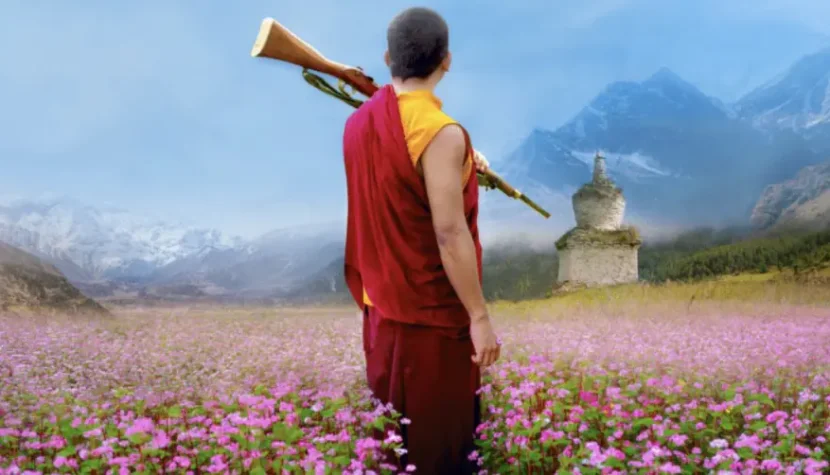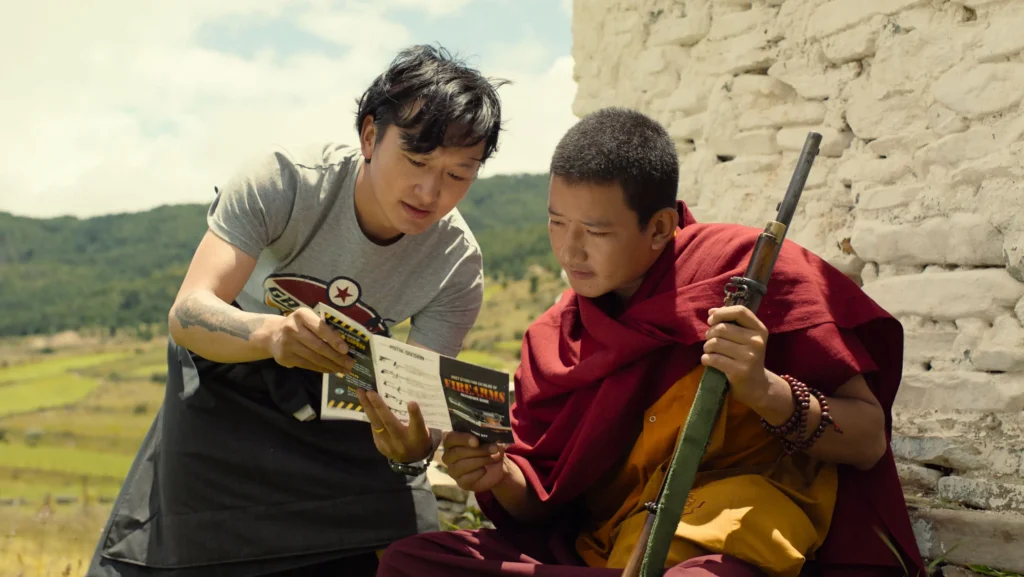MONK AND THE GUN. Drop everything and go to Bhutan

The picturesque Bhutan is considered the happiest country in the world – partly because instead of tracking GDP, they follow GNH, which stands for Gross National Happiness. It also happens to be one of the youngest democracies in the world, having transitioned from a feudal monarchy to a constitutional monarchy based on free elections only in 2006, the same year British guardian of world democracy James Bond was already starring in his 22nd film. The story of how democracy was introduced at the edge of the world in Bhutan is told in Pawo Choyning Dorji’s second film,”Monk and the Gun”.
“Monk and the Gun” is set at the dawn of these historic changes, as Bhutan prepares for its first elections following the king’s abdication. However, before that can happen, the Bhutanese – mostly rural villagers unfamiliar with the concept of people’s rule – need to be taught the basics, so mock elections are organized. Dorji’s film follows the events leading up to this dress rehearsal for the celebration of democracy in one of Bhutan’s villages, interweaving the stories of several characters: a determined official aiming to implement democracy in her homeland, her assisting housekeeper whose family is torn apart by the democratic campaign, a city slicker who, along with an American arms collector, tries to acquire a valuable artifact from the Civil War, and the titular monk tasked by his lama with the important yet enigmatic mission of acquiring two firearms by the full moon. The time set by the spiritual leader serves as a metronome in “Monk and the Gun,” rhythmically and dynamically driving the events forward, gradually interlocking and leading inevitably to a grand finale that punctuates Bhutan’s democratic reforms.

While such a premise could suggest a contemplative psychodrama delving into multifaceted ideological dialogues and ethical dilemmas, “Monk and the Gun” is a cheerful comedy filled with nearly slapstick mishaps and misunderstandings; often the essence of the joke lies in the contrast between Western sensibilities (shared by the intended audience) and the different Bhutanese culture. Despite the somewhat ominous sound of a monk searching for firearms, Dorji uses this figure wittily as the linchpin of a fable about a country unsure if it wants to be transformed. Everything is presented with remarkable warmth and a sense of restraint, preventing excessive rapture over Bhutanese landscapes. It’s no coincidence that characters are fascinated by James Bond (here portrayed by Daniel Craig) – “Monk and the Gun” shares a similarly unpretentious charm as stories involving agent 007. The comparison might be distant, but is pairing a Buddhist monk and an AK-47 any less strange?
“Monk and the Gun” is largely a moralistic tale, showing how the traditional, unique values of the Bhutanese lead to happiness and a harmonious life. The “villains” in the film – both threatening and comically unlucky – find the right paths guided by Buddhist monks and the widespread belief in karmic balance. On the other hand, Dorji raises interesting questions about the rush towards modernization and the fascination with Western models, even openly questioning why the happy Bhutanese need exposure to the brutal and problem-laden late capitalism. These themes resonate intriguingly against the idyllic shots of a Himalayan village, making it a pity that Dorji only drops them into the narrative cauldron without attempting a more meaningful conclusion. This reflects the caution of an aspiring international filmmaker who, instead of diving into deeper reflections and social critiques, prefers feel-good entertainment. In the end, this approach doesn’t even turn out badly, as the narrative caution aligns with Buddhist doctrines and strengthens the titular metaphor.

If we are to witness a Bhutanese offensive in international cinema, Dorji will undoubtedly be its standard-bearer. “Monk and the Gun” is a worthy successor to “Lunana: A Yak in the Classroom” in offering Western audiences postcard-like scenes and genre vignettes showing how beautiful, amusing, and pleasant the country in the Himalayas is. Even if we intuitively feel that Dorji is glossing over reality with liters of syrup and his vision of a happy Bhutanese existence is as much idealized as it is propagandistic, it’s hard to criticize – it’s all put together so neatly.

